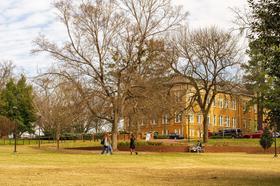Thorne Bay School in Thorne Bay, AK, serves 63 students from prekindergarten through 12th grade with a student–teacher ratio of 13:1, which is higher than the state average of approximately 11:1.
Math proficiency ranges between 21% and 39%, which is lower than the Alaska state average of 32%, showing a decline from 30% in 2019; reading proficiency is between 21% and 39%, approximately equal to the state average of 29%.
Science proficiency is at or above 50%, higher than the state average of 38%, ranking in the top 30% statewide.
The graduation rate has been consistently at 50%, which is lower than the Alaska state average of 78%.
Enrollment declined from 74 students in 2019 to 63 in 2023, while eligibility for free lunch decreased from 50% in 2019 to 43% in 2023, indicating changes in the school's socioeconomic composition.
Quick Facts (2026)
- Grades: Prekindergarten-12
- Enrollment: 63 students
- Student-Teacher Ratio: 13:1
- Minority Enrollment: 27%
- Graduation Rate: ≥50% (Top 1% in AK)
- Overall Testing Rank: Bottom 50%
- Math Proficiency: 21-39% (Btm 50%)
- Reading Proficiency: 21-39% (Top 50%)
- Science Proficiency: ≥50% (Top 30%)
- Source: National Center for Education Statistics (NCES), AK Dept. of Education
School Overview
Thorne Bay School's student population of 63 students has stayed relatively flat over five school years.
The teacher population of 5 teachers has declined by 16% over five school years.
Grades Offered
Grades Prekindergarten-12
(Supplemental Virtual)
(Supplemental Virtual)
Total Students
63 students
Gender %
Total Classroom Teachers
5 teachers
School Rankings
Thorne Bay School ranks within the bottom 50% of all 441 schools in Alaska (based off of combined math and reading proficiency testing data).
The diversity score of Thorne Bay School is 0.45, which is less than the diversity score at state average of 0.71. The school's diversity has stayed relatively flat over five school years.
Overall Testing Rank
#238 out of 441 schools
(Bottom 50%)
(Bottom 50%)
Math Test Scores (% Proficient)
21-39%
32%
Reading/Language Arts Test Scores (% Proficient)
21-39%
29%
Science Test Scores (% Proficient)
≥50%
38%
Student-Teacher Ratio
13:1
15:1
American Indian
11%
22%
Asian
3%
5%
Hispanic
3%
8%
Black
n/a
2%
White
73%
47%
Hawaiian
n/a
3%
Two or more races
10%
13%
All Ethnic Groups
Graduation Rate
(21-22)≥50%
78%
Participates in the National School Lunch Program (NSLP)
Yes
Eligible for Free Lunch
52%
37%
Eligible for Reduced Lunch (21-22)
31%
4%
School Statewide Testing
School District Name
Source: National Center for Education Statistics (NCES), AK Dept. of Education
Profile last updated: 02/09/2025
Frequently Asked Questions
What is Thorne Bay School's ranking?
Thorne Bay School is ranked #238 out of 441 schools, which ranks it among the bottom 50% of public schools in Alaska.
What percent of students have achieved state testing proficiency in math and reading?
21-39% of students have achieved math proficiency (compared to the 32% AK state average), while 21-39% of students have achieved reading proficiency (compared to the 29% AK state average).
What is the graduation rate of Thorne Bay School?
The graduation rate of Thorne Bay School is 50%, which is lower than the Alaska state average of 78%.
How many students attend Thorne Bay School?
63 students attend Thorne Bay School.
What is the racial composition of the student body?
73% of Thorne Bay School students are White, 11% of students are American Indian, 10% of students are Two or more races, 3% of students are Asian, and 3% of students are Hispanic.
What is the student-teacher ratio of Thorne Bay School?
Thorne Bay School has a student ration of 13:1, which is lower than the Alaska state average of 15:1.
What grades does Thorne Bay School offer ?
Thorne Bay School offers enrollment in grades Prekindergarten-12 (Supplemental Virtual).
What school district is Thorne Bay School part of?
Thorne Bay School is part of Southeast Island School District.
School Reviews
5 10/10/2025
We will miss Principal Rob O'Neal :(
Rob really connects with the kids. I know they will miss Rob O'Neal :(
Review Thorne Bay School. Reviews should be a few sentences in length. Please include any comments on:
- Quality of academic programs, teachers, and facilities
- Availability of music, art, sports and other extracurricular activities
Recent Articles

Public School Transportation & Commute Planning Guide
Learn how public school transportation and commute planning can help families prepare for the coming school year safely and efficiently.

New Public School Safety Protocols 2025–26 Guide
Learn how new public school safety protocols for 2025–26 affect students, parents, and schools nationwide.

How Technology Transforms Education in 2025
Explore how technology shapes learning today, with updated data, policy context, trends, and real-world implications for students, educators, and families.






